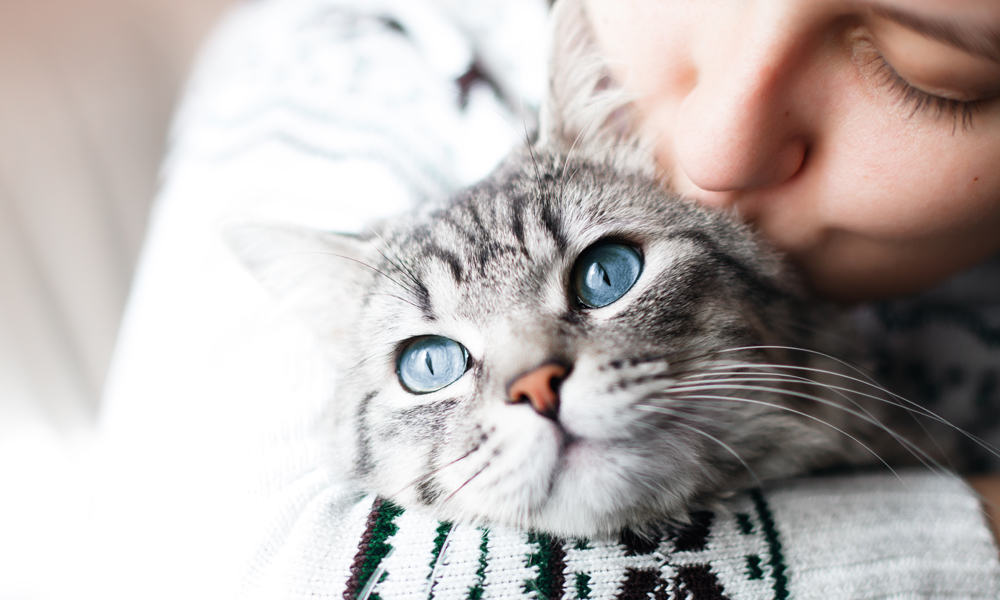Sometimes, we humans think of kitty as the no-nonsense, aloof soul, while the dog is the loyal friend who wants to tag along everywhere we go. But that mindset can distract us from recognizing what our four-legged friends really need from us.
Even though we think of cats as independent, it doesn’t mean cats are like teenagers — that the longer mom and dad stay away, the happier they feel. In fact, it can be the opposite. Those who have lived with cats already know this, but felines get pretty attached to their humans. Sometimes, to a greater extent than dogs! Read what cats revealed about their attachment to us in this fascinating 2019 study.
How much time should I spend with my cat?
In many families, daily quality time with pets happens organically. Maybe you spend part of the evening unwinding together in bed or on the couch, with kitty nestled beside you while you stroke his head juuuust so. Or maybe when you’re having a work-from-home day, kitty curls up on your lap. Snuggle sessions definitely count as quality time. As kitty purrs in appreciation, that’s a sign your cat is feeling secure and bonded with you.
But cats need more than that from their humans. This comes down to knowing the building blocks to a happy, healthy feline life.
Cats need an environment that lets cats be cats. On the one hand, they need to feel secure, with food, water and a place to eliminate. But cats also are active and curious creatures, so they’ll need a means to explore, climb, perch and scratch.
Therefore, to keep your cat in a healthy mental state (not to mention physical, because obesity in cats is an epidemic), regular play sessions have an essential role.
While you’re hanging out, bring out one or two of kitty’s favorite toys to get them moving. The best strategy is to choose things that stimulate their hunting instincts, triggering them to stalk and pounce. If possible, do this for 10 or 20 minutes a day (or until kitty loses interest). Here’s another benefit to playing. If your cat is active or rambunctious at night, adding a couple of extra-rigorous play sessions during your waking hours can help them burn off some of that excess energy, so you can (hopefully) enjoy a more restful sleep environment.
Do cats get lonely if you leave them alone?
Inevitably, when you talk about the right amount of time to spend with your cat, the topic of leaving always comes up.
People who live lives on the go often find that cats make ideal pets. Just leave out the essentials, and the cat’s good to go for a few days, right? The fact that they sleep 12-15 hours a day also helps because it’s just another way for them to pass the time.
Still, as their enthusiastic greetings attest, cats do miss us when we’re gone. If you’re taking a trip, how can you make the separation easier?
A big one is having someone do regular check-ins. If you’re traveling, even for a weekend, it’s always a good idea to have a friend or family member make daily visits. There are practical reasons for doing this. Automatic feeders get jammed and water dishes can tip over. Having company can do a lot to make cats feel better about being on their own.
Ideally, choose someone they already know and like, who makes regular visits even when you’re not traveling. (Otherwise, if your cat has separation anxiety, they’ll associate this person with you being gone, and that can kick off some of the troublesome behavior we’ll explain further below.) The goal is to make sure kitty’s needs are met during your absence while making him feel as secure as possible.
While some cats clamor for attention, many others respond by hiding or even hissing. Even if they opt out on human companionship, having someone over can still assure them their needs are being met while you’re gone.
Besides that, you can and should add enrichment to the home environment to make the time away more bearable for kitty. A few ideas:
- Invest in a puzzle feeder or a treat puzzle. These tap into their hunting instincts, allowing them to actively pursue food.
- Play cat videos. Turning on a computer or TV screen with a timed shut-off gives cats something visually interesting to watch.
- Open the curtains to let the cat look outside, preferably in a space with a shelf or cat hammock. Even better, open the window a crack for a few hours, if possible.
- Encourage play by setting out new playthings for kitty.
- Simple things, like a new cardboard box or an opened paper bag, can provide hours of play.
Do cats get separation anxiety?
Unlike dogs, there isn’t a formal diagnosis of separation anxiety in cats. That said, some cats do show the classic signs of separation anxiety when their humans aren’t around. So while the cat can be perfectly at ease with the fact that their human leaves the house to go to work every day, a weekend absence or longer can make their anxiety flare up.
One of the most prominent signs of separation anxiety in cats is urinating and defecating in inappropriate places. If that’s the case, it’s not uncommon for humans to come home to find that kitty has soiled their human’s bed. Before you chalk this problematic behavior to separation anxiety, here are a couple caveats.
- Medical problems can often show up in bathroom issues, so observe your cat for other signs of illness.
- Check the cat box. A too-full box, especially after a long weekend, can inspire your cat to “go” elsewhere.
To learn more about this behavior and what you can do about it, check out Raising Your Paws podcast Episode 60.
Here are other signs of separation anxiety in cats:
- Vomiting
- Vocalizing
- Poor appetite
- Clinginess
- Excessive grooming
- Increased aggression (i.e., the cat bites or scratches during play after your return)
What can you do about cat separation anxiety?
The goal is to help kitty feel more at ease when you leave for a few days. Here are some things you can do to help.
Keep arrivals and departures low key
Whether you’re leaving or coming home, don’t turn it into an event. No petting, no acknowledgments, even if kitty is meowing and rubbing against your legs. The goal is to make your comings and goings into non-events.
Departure training
Sometimes, cats get triggered by specific departure cues, such as packing your suitcase and picking up your keys. If your cat associates these with your absence, it can kick off the spiral of separation anxiety. If your cat has a history of showing signs of stress while you’re getting ready, you can eliminate the potency of your “I’m-going-away” cues. This can make travel less stressful for everyone. For example:
- First, pack your suitcase. Don’t go anywhere. Just play with your cat, do what your normally do at home, and at some point, unpack the suitcase and put it away.
- Then, graduate to packing your travel bags, stepping out the door, and immediately returning.
- Finally, bring your suitcase on brief outings, such as running your weekend errands, and return with it. Vary the length of time you spend away from home.
Doing these things can help your cat get the message: Nothing bad happens when you pack your suitcase.
Check into anti-anxiety remedies
Some cats respond well to medication and other treatments that alleviate stress and anxiety. Your cat’s vet or primary health care provider should have some good options.
Happier cat when you’re at home and away
Cats adore their humans and love having them around. Because it’s not possible to stay home 24/7, it’s essential to understand their needs when you’re not around. By taking the above steps, you can make your cat feel secure and loved, whether you’re home or away.
Looking for better results from your cat’s diet? Discover the benefits of NutriSource: healthier skin, fewer hairballs, less offensive cat box odors and a healthy coat you love to pet. Discover the benefits of our proprietary Good 4 Life supplements, and shop for NutriSource at your local, independent pet supply retailer.


